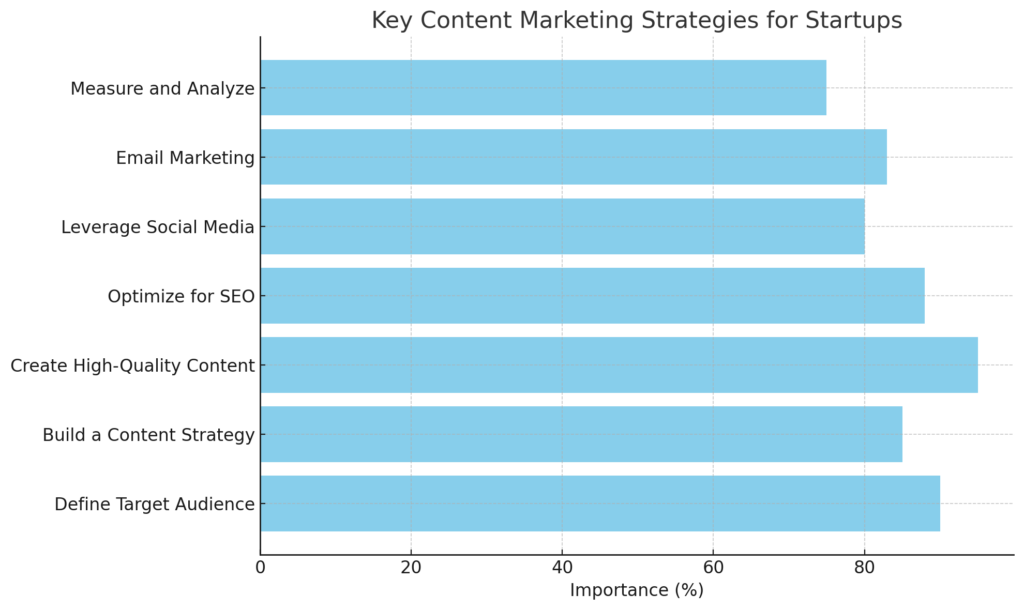Content Marketing for Startups: How to Build a Loyal Audience
In the fast-paced digital world, content marketing has become a crucial tool for startups aiming to build a loyal audience, establish credibility, and generate consistent leads. By creating valuable and engaging content that resonates with your target audience, startups can nurture long-term relationships, foster brand loyalty, and ultimately drive business growth.
For startups, content marketing is especially effective because it allows them to compete with larger brands by focusing on delivering relevant information that solves problems or addresses the needs of their audience. In this article, we will explore the best content marketing strategies for startups, how to implement them effectively, and how they can help build a loyal and engaged audience.
1. Why Content Marketing is Essential for Startups
Before diving into strategies, it’s important to understand why content marketing is crucial for startups. Unlike traditional advertising, content marketing focuses on providing value to your audience rather than pushing for an immediate sale. For startups, this is critical because:
- Cost-Effective: Content marketing typically has a lower cost than paid advertising and delivers long-term results.
- Builds Trust and Credibility: High-quality content demonstrates your expertise and helps establish your startup as a thought leader in your industry.
- Attracts Organic Traffic: SEO-optimized content can attract visitors from search engines, providing a steady stream of potential leads.
- Fosters Audience Engagement: Content marketing allows you to communicate with your audience, respond to their needs, and build a loyal following over time.
In a crowded market, content marketing helps startups differentiate themselves by delivering valuable and engaging information.
2. Define Your Target Audience: The Foundation of Effective Content Marketing
The success of your content marketing efforts hinges on understanding who your audience is and what they care about. Defining your target audience is the foundation of your content strategy because it guides everything from the type of content you create to how you promote it.
Steps to Define Your Audience:
- Market Research: Conduct research to identify your audience’s demographics, behaviors, challenges, and needs. What problems are they trying to solve? What are their pain points?
- Develop Buyer Personas: Create detailed profiles of your ideal customers, including their age, profession, interests, and goals. Buyer personas help you tailor your content to address specific concerns and needs.
- Segment Your Audience: Not all of your content will be relevant to everyone. Segment your audience based on factors like their stage in the buying process, their interests, or their level of engagement with your brand. This allows you to create more personalized content.
Understanding your audience ensures that the content you produce resonates with their needs, which is essential for building a loyal following.
3. Build a Content Strategy: Set Clear Goals and Objectives
A well-defined content strategy is key to guiding your content marketing efforts and measuring your success. Before you start creating content, set clear goals and objectives that align with your startup’s overall business goals.
Key Elements of a Content Strategy:
- Define Your Goals: Are you trying to drive traffic to your website, increase brand awareness, or generate leads? Your goals will shape the type of content you create.
- Content Types: Decide on the types of content you will produce, such as blog posts, videos, podcasts, infographics, or eBooks. Choose formats that align with your audience’s preferences and your startup’s resources.
- Frequency and Consistency: Determine how often you will publish content. Consistency is crucial for maintaining audience engagement, so create a content calendar to plan and schedule your posts in advance.
- Promotion Plan: Your content won’t reach your audience unless you promote it. Outline a plan for distributing your content across channels like social media, email, and paid ads.
Your content strategy should be flexible and allow for adjustments based on performance metrics and audience feedback.
4. Create High-Quality Content: Deliver Value and Build Authority
The cornerstone of successful content marketing is high-quality content that delivers value to your audience. It’s not enough to produce content for the sake of it—your content should be insightful, informative, and relevant to your audience’s needs.
Tips for Creating Engaging Content:
- Solve Problems: Focus on addressing your audience’s pain points. For example, if your startup offers a software solution, create content that explains how to solve common industry problems using your product.
- Be Educational: Provide useful information that educates your audience about your industry, product, or service. Educational content helps establish your brand as an expert in your field.
- Use Storytelling: Storytelling is a powerful way to connect with your audience on an emotional level. Share success stories, case studies, or even behind-the-scenes content to humanize your brand.
- Multimedia Content: Incorporate different formats like videos, podcasts, and infographics to appeal to a wider audience. Visual and interactive content tends to have higher engagement rates.
High-quality content helps build trust and authority, positioning your startup as a credible source of information in your industry.
5. Optimize for SEO: Attract Organic Traffic
To ensure that your content reaches the right audience, it’s essential to optimize it for search engines (SEO). SEO-optimized content not only helps your website rank higher in search engine results but also drives consistent organic traffic over time.
SEO Best Practices for Content Marketing:
- Keyword Research: Identify the keywords and phrases your target audience is searching for and incorporate them naturally into your content. Use tools like Google Keyword Planner or Ahrefs for research.
- On-Page Optimization: Ensure your content has relevant title tags, meta descriptions, and header tags (H1, H2, etc.). This helps search engines understand your content better.
- Internal and External Links: Link to other relevant pages on your website (internal links) and reputable external sources to enhance the authority of your content.
- Mobile Optimization: Ensure that your content is mobile-friendly, as a significant portion of web traffic comes from mobile devices.
- Fresh and Updated Content: Regularly update older content to keep it relevant and fresh. Search engines favor sites that provide up-to-date information.
By following SEO best practices, your content will be more discoverable, attracting new visitors to your site and helping you build a loyal audience.
6. Leverage Social Media: Amplify Your Reach
Social media is a powerful tool for amplifying the reach of your content and engaging with your audience. For startups, it’s essential to use social platforms to distribute content, spark conversations, and foster community.
Social Media Content Marketing Strategies:
- Choose the Right Platforms: Focus on the social media platforms where your target audience is most active. For B2B startups, LinkedIn may be the best choice, while B2C startups may find success on Instagram, Facebook, or Twitter.
- Engage with Your Audience: Social media is a two-way communication channel. Respond to comments, engage in discussions, and ask for feedback to foster stronger relationships with your audience.
- Share User-Generated Content: Encourage your customers to share their experiences with your product or service. User-generated content is highly authentic and builds trust with potential customers.
- Run Social Media Ads: If you have a budget, consider running targeted social media ads to promote your content to a broader audience. Platforms like Facebook and Instagram allow you to narrow down your audience based on demographics, interests, and behaviors.
Social media allows you to amplify your content and engage with your audience in real-time, helping you build a loyal and engaged community.
7. Email Marketing: Nurture Relationships and Build Loyalty
Email marketing is one of the most effective ways to nurture relationships with your audience and keep them engaged with your content. By delivering personalized, relevant content directly to your subscribers’ inboxes, you can build long-term loyalty and drive conversions.
Email Marketing Tactics for Startups:
- Build Your Email List: Use lead magnets like downloadable eBooks, exclusive content, or discounts to encourage website visitors to sign up for your email list.
- Segment Your Audience: Divide your email list into segments based on user behavior, interests, or buying stage. This allows you to send more personalized content to each segment.
- Automate Email Campaigns: Set up automated email workflows to nurture leads over time. For example, send a welcome series to new subscribers or re-engagement emails to inactive subscribers.
- Provide Value in Every Email: Avoid overly promotional emails. Instead, focus on delivering valuable content that helps your audience solve problems or learn something new.
Email marketing keeps your startup top of mind and helps you build stronger relationships with your audience over time.
8. Measure and Analyze: Optimize Your Content Marketing Strategy
Like any other marketing strategy, measuring and analyzing the performance of your content marketing efforts is crucial to long-term success. Tracking key performance metrics allows you to identify what’s working, what’s not, and how you can optimize your strategy for better results.

Content Marketing Metrics to Track:
- Website Traffic: Monitor how much traffic your content is driving to your website and which pieces of content are performing the best.
- Engagement Metrics: Track metrics like time on page, bounce rate, and social shares to measure how engaged your audience is with your content.
- Conversion Rates: Measure how effectively your content is converting visitors into leads or customers.
- Email Engagement: Track open rates, click-through rates, and unsubscribe rates for your email campaigns to gauge the effectiveness of your email marketing.
By analyzing these metrics regularly, you can refine your content marketing strategy and continue delivering content that resonates with your audience.
Building a Loyal Audience Through Content Marketing
Content marketing is one of the most powerful tools for startups to build a loyal audience, generate organic traffic, and establish authority in their industry. By understanding your target audience, creating high-quality content, optimizing for SEO, and leveraging social media and email marketing, startups can build long-term relationships with their customers and drive sustainable growth.
While content marketing requires consistency and patience, the long-term rewards are well worth the effort. Start by defining your content strategy, delivering valuable content, and engaging with your audience, and you’ll be on your way to building a loyal, engaged community that supports your startup’s success.







